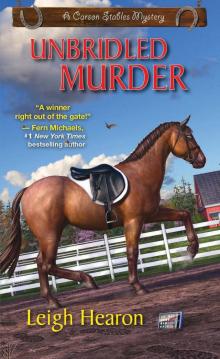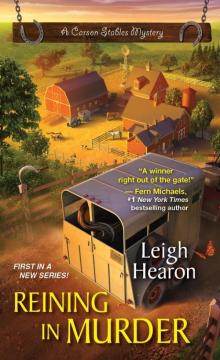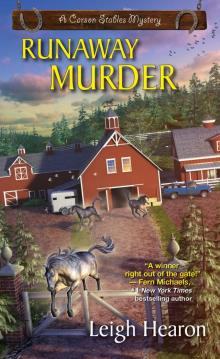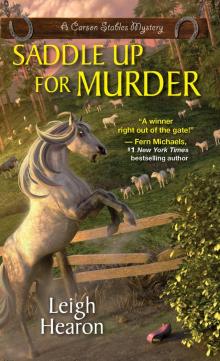- Home
- Leigh Hearon
Saddle Up for Murder Page 5
Saddle Up for Murder Read online
Page 5
Hot damn, the kid was right. Annie was struck by Ashley’s intuitive sense of how to solve a problem that had stymied her that morning. And, truth be told, she was tired of mucking six stalls every day. Besides, she was now on Marcus’s payroll, in her new job of finding homes for his deceased wife’s horses. She could afford to have a little help right now.
She turned around in the saddle and called out, “Ashley? Wait up a sec.”
But Ashley seemingly had disappeared into thin air.
CHAPTER 6
THURSDAY MORNING, MAY 5
The next morning, Annie cursed herself for not hiring Ashley the previous day. She’d overslept—something she never did—and it was all Marcus’s fault. He had phoned again last night and the conversation had lasted far beyond Annie’s usual bedtime. His calls, as delightful as they might be, made her do things like roll over at six AM and turn off the alarm in her sleep. It was unthinkable. As soon as her chores were done at the stables, she intended to find the phone number Ashley had given her, call her up, and tell her if she wanted a job, she had one. Immediately.
For all of her adult life, Annie had eschewed outside help with her horses. The primary reason was that deep down she thought only she could best do the job. But the secondary reason was that she really didn’t want to share her horses with anyone else—at least, not on a daily basis. Her life had not been particularly easy. Her father had left the family when she was eleven, and her mother had died of cancer when she was in her early twenties. She had no siblings; Lavender, the progeny of her father’s second marriage, didn’t count in her book. Aside from her own short-lived marriage after college, she’d had no real or long-standing relationship with a man. The reality was that her closest relationships were with her horse companions.
But horses could be fickle. Introduce a new person to the herd and all of a sudden a horse who never let Annie comb her tail without swishing it out of her hands—that would be Baby, her youngest, and a Saddlebred—would suddenly let a youngster pull on and swing from its tail without batting one of its pretty eyelashes. As Annie recalled, that’s how she’d met Hannah, the eight-year-old who lived nearby and was certifiably horse crazy. Hannah had never tried such a dangerous stunt again in Annie’s presence, and had become a very good young rider. She also had a way of melting the most persnickety or world-weary horse’s heart.
Now, leaning on her muckrake, Annie thought seriously about her existing circle of friends. Aside from her horses, whom was she truly close to? She had lots of acquaintances—she had regular contact with horsemen and women in the tri-county area, and her relationships with Dan and the deputies she knew through rescue missions were usually tolerable. But there really wasn’t anyone to whom she could tell her innermost hopes, dreams, and fears—except her horses. Which is why opening up—just a crack, but it was a crack—to Marcus now was making her deliriously happy and angry with herself at the same time. How could she risk a human relationship if she was letting down her horses?
But talking to Marcus was so much fun. She smiled, remembering their conversation the previous night, when Annie had described Ashley’s unexpected visit.
“Tell me how you start your day, Annie,” he’d urged. “You’ve never told me.”
“It’s not that exciting.”
“Let me be the judge of that,” he’d replied, and Annie had plunged in.
“Well, I roll out of bed around six, feed the dogs and cat, get in my mucking gear—”
“What’s that?”
“Clothes only my horses see me in. Old jeans, flannel shirts, mucking boots . . .”
“No designer labels, I take it?”
“’Fraid not.” Annie had laughed at the idea. “Then I feed my horses, turn them out, muck their stalls, make their mashes for the evening, that kind of thing. Next, I drive up to the sheep pasture and feed the ewes and Trotter—he’s there for the summer—and then go home. And take a shower. Believe me, by then I need it.”
There had been a long pause. Then Marcus had asked, warily, “Are you telling me every single animal on your ranch is fed breakfast before you?”
Annie had been taken aback. She’d never thought about it before.
“I guess so.”
“Hire this woman,” Marcus had promptly replied.
Annie sighed. She should have, but since she hadn’t—yet—her long workday stretched out before her, and it was time to start whittling away at her chores. She stored the wheelbarrow in its usual place and grabbed the dolly next to it. Her hay supply was running low in the tack room. It was time to replenish it from the hay barn in back.
Annie was proud of her hay barn, which she’d built two years ago after an exceptionally good shearing season. She’d hired local builders and overseen every beam they’d erected and every nail they’d hammered. The structure was tall and sturdy, impervious to mercurial weather patterns, including sideways rain and the occasional snowstorm. The concrete floor was large enough to hold four tons of Eastern Washington Timothy and the same amount of local orchard grass. The sliding doors were well oiled and hitched back securely. Air outlets in the ceiling ensured no fire would erupt during the few hot summer months the Peninsula granted its residents. Two LCD lights in protective coverings made the barn easy to navigate in the dark in winter months, when twilight started at four-thirty and darkness would swathe the entire farm by six. It was a thing of beauty, Annie thought whenever she gazed upon it, and just to make sure it would always appear so, she’d paid a high school kid to apply a clear coat of stain a few months after it had been built.
She strode toward it now, pride of ownership foremost on her mind. Wondering how much hay she could reasonably stack on the dolly and still push it, she slid open the doors, flipped on the overhead lights—and screamed.
Hanging still, only a few feet off the ground, was Ashley Lawton. Her head leaned to one side, and Annie could see thin, angry red marks creased into her neck from the hay twine that had served as her noose. Her face was bluish, and her tongue protruded from her mouth. She was wearing the same clothes she’d had on when Annie had encountered her just the day before—only now, instead of clean and pressed, they were rumpled, with stains of mud and grit on every side.
Annie realized she was shaking. She carefully put the dolly to one side and stood still, etching every frame of the scene into her brain. She cautiously looked up. The twine, normally used to secure hundred-pound bales of hay, extended to a low beam by the left door. It was the only one she could have used; the ceiling beams framing the barn were far too high and could be accessed only by an extended ladder, which was not kept here. She wondered how it could have happened. Why it happened. When it happened. And throughout her swirl of thoughts, Annie kept wondering, Really? You hang a few feet off the floor and you kill yourself? That’s all it takes?
Feeling a bit steadier, she walked quietly around the hay barn, searching for anything that Ashley might have left behind. She found nothing—no note, no handbag, not a single scrap of anything that gave a clue to the scene before her. She’d worn her ranch gloves when she entered the barn—bucking hay without them could be murder on one’s hands—and now was glad she had, as she knew fingerprints on the door handles would be taken. Murder. Had she thought about murder? Was this death a homicide? Annie once again felt dizzy and plunked down on the nearest hay bale. Hell, maybe the hay bale was evidence. Maybe she should just leave. In her daze, she got up, dusted off her rear, and exited the barn, now securing the doors with a lock. It was time to call the experts.
* * *
“Stop finding dead bodies” was Dan’s terse greeting when he arrived at her stables.
“Sure thing, Dan. I’ll remember to do that.”
Annie looked at Dan with what she hoped was cool disdain.
By now, Annie had taken a quick shower—the thought that hot water might be erasing key evidence had been trumped by the odor amassed from mucking six stalls. She also had consumed a much needed cup of coffee.
The last time Annie had discovered a dead body, it had been in a home in the nearby community of Shelby, and there was no question that it had been a homicide. She’d watched Suwana County deputies in action that day as they staked out the crime scene, collected evidence, and generally took over the home. Now her own property had been desecrated and was being similarly ransacked by cops.
There was one thing more that troubled Annie, although she tried to shove it to the back of her mind. If she hadn’t been so busy flirting with Marcus on the phone last night, she might have taken the time to call Ashley to offer her a job. Maybe she could have saved her. Or not. She dreaded hearing from Dan or the coroner the time that Ashley had died.
Annie and Dan were standing in front of the stables, where Dan had parked his patrol vehicle. In the distance, she watched Deputy Elizalde snake his way inside the barely cracked barn doors with gloved hands as several other deputies began to wrap “accident scene” tape around the barn perimeter. She was glad he had a face mask on.
“Do you have any idea who’s hanging there?” Dan jabbed one angry finger toward the hay barn.
“I told Esther. Ashley Lawton. She walked onto my ranch yesterday and asked for a job. I told her I didn’t have any but would let her know if I heard of anything. She gave me a list of references and her cell number. Then she left. Ironically, I was thinking just this morning of calling her and offering her at least part-time employment.”
I wish I’d called her last night. Annie could not push the thought out of her head.
Dan sighed. “I guess I wasn’t making myself clear. Remember that case I told you about while we were waiting for the bridge to open? About the old lady who allegedly died in her sleep?”
“Yeah.” A few neurons fired up in Annie’s brain. “Ashley said she’d recently worked for an outfit like the one taking care of the lady who died.”
“Not ‘like one.’ The one. Ashley Lawton was the primary home care aide assigned to take care of the old lady, one Eloise Carr, and the one who found her deceased. After we discovered the missing pills in the home, we ran a background and discovered Ashley has—had—a pending case in Suwana County Superior Court for drug possession without a prescription. Predictably, her employer canned her. You may have been about to hire little missy, but I was about to haul her in for questioning.”
Annie was stunned. She’d talked to Ashley for all of five minutes, but she found it hard to believe that this shy but earnest young woman was guilty of stealing pills.
“But she seemed so nice!” She instantly felt like Sarah, bemoaning her failure to see through the boarding facility owner’s assurances that her Tennessee Walker was doing just fine. “Besides,” Annie went on, “she probably has—had—a lawyer by now. What makes you so sure you’d have been able to talk to her, anyway?”
“Damn public defenders. Always there when you least want them,” Dan grumbled, conceding the point. “But you’re not the only one who was taken in. Ronald, Mrs. Carr’s son, was pretty shocked when he heard about Ashley’s criminal history. Said he never would have suspected Ashley of doing such a thing to his mother. Claimed he’d often seen the two of them interacting when he visited. According to his mom, Ashley was more like a granddaughter than a caretaker. Just goes to show.”
“Show what, Dan?” Annie’s tone was sharp. “Both of them are dead, so now we’ll never know whether Ashley was innocent or not.”
“Maybe, maybe not. It so happens that Ashley was training a new home aide the morning she discovered Mrs. Carr dead in her bed. Her apprentice went with her to the Carr residence and saw everything.”
“Well, bully for you, Dan. I hope you find out the truth.”
“You tell me. The aide-in-training was your sister, Lavender. Is she even capable of telling the truth?”
Annie didn’t have an answer.
CHAPTER 7
THURSDAY AFTERNOON, MAY 5
Dan had mercifully left Annie alone after giving her the news about Lavender. She thought of calling Martha and letting her know, but then recalled their conversation yesterday and intuited that the “bit of a shock” Martha had alluded to was Lavender finding Eloise Carr dead in her home. She refused to think about Lavender’s possible involvement with any drug thefts. Lavender was so squeaky clean that she probably didn’t take Aleve for menstrual cramps but chewed some kind of plant bark instead.
However, Lavender’s reputation for truthfulness was not entirely spotless, as Annie had learned during the few short weeks she had shared her home with her half sister. True, most of Lavender’s lies had been those of omission—for example, her failure to tell their shared bio father that she was taking his Aston Martin on the road without a valid driver’s license. Or assuring Annie she was skilled in paranormal animal communication, and had deep connections with local Native American elders, who probably ran when they saw her coming. Yet deep down, Annie knew that Lavender’s deceptions were deployed only to cover up her own insecurities and lack of confidence. These reasons hardly compensated for her half-truths, but they were somewhat understandable. Somewhat.
The horses were far out in the pasture now, enjoying new, delicious spring grass and, judging by their absence, had zero interest in what was taking place back at the stables. Annie wished she could be as blasé as her herd. She walked over to Leif, the local volunteer fireman who had the distinct honor of driving the prized fire truck housed in Oyster Bay to every local accident and disaster. Leif also sheared her sheep twice a year. Privately, Annie thought Leif was a better shearer than EMT, but she kept her opinion to herself.
Leif and the fire truck had arrived five minutes before the sheriff this morning. This was hardly surprising; Annie knew that Leif kept his police and fire radio on 24/7 and he was four miles closer to her place. He was standing by the barn now, trying to get information but, judging by the lack of interest around him, not getting very far.
“Hey, Leif.” Annie walked up and stretched out her hand.
“Annie! Can you believe it? We’re working on another case together.”
Her sarcastic nature, Annie’s way of trying to control her temper, emerged again.
“Hardly, Leif. I just happened to find a dead woman swinging from the barn rafters this morning. Not an everyday occurrence, so I thought I’d share it on the airways so all my neighbors could take a look, too. Have you had the pleasure yet?”
Leif, immune to Annie’s gallows humor, ignored her rude rejoinder and answered honestly.
“Not yet. They’re still doing their thing in there and won’t let me have so much as a glance. I could be here three more hours until they cut her down and let me haul her over to Hank.” He sounded so crestfallen, Annie laughed.
“Most people don’t relish the job of transporting stiffs.”
“Annie, that’s not fair! I’m just trying to do my civic duty and earn a living. I’m happy to help out, you know I am, but I got to pay the bills, too. And the garage pays me only when I’m there.”
He had a point. Like many Peninsula residents, Leif cobbled together several professions in order to survive. Fall and spring, he’d be working on every sheep operation within a fifty-mile radius. During the winter, he was a dependable grease monkey at the Oyster Bay garage. Annie wasn’t sure what Leif did during the summer. He probably went out on his sailboat and drank beer. And why not? Summers on the Peninsula were too precious to waste working inside all the time.
“Have you learned anything?” she asked Leif.
“Only that she’s a twenty-year-old local female and probably died from asphyxiation, possibly also cerebral hypoxia. That’s typically what happens from a short drop.”
Bile filled Annie’s mouth.
“How do you know all this?” Leif probably took books about causes of death to bed with him, Annie thought.
“Oh, I just try to keep up on things that might pertain to my job,” he said modestly. “You know I’m taking the police officer exam next month.”
/> “I had no idea, Leif.” Annie was honestly surprised. “But good for you. I get that Ashley was strangled by the twine. But cerebral hypo . . . whatever you said. I’m assuming that means her neck was broken? That’s what I always thought happened when a person hanged.” Annie’s knowledge of death by hanging was limited to what she’d seen in old Westerns.
“Ashley? You know her name?” Leif asked eagerly.
Why not? It’ll be in the online edition of the Port Chester Gazette tonight, if not already, Annie thought. The printed version wouldn’t be out for another week; the local newspaper came out only on Wednesdays.
“Ashley Lawton,” Annie clarified. “She actually came here yesterday afternoon, looking for work at the stables. Not sure why she chose to hang herself here.”
“Whoa. That’s deep.”
Annie thought “deep” didn’t cover the half of it. She felt immense guilt over Ashley’s death, and wished, for the hundredth time, she’d offered the young woman a job when she’d asked for one. At the same time, she felt a small surge of anger for Ashley’s decision to kill herself on her ranch. She had a feeling that the memory of encountering Ashley’s body would never quite go away.
“Obviously, I didn’t have work for her. But to stage her body so I’d find it . . . it just seems harsh. Or, to be honest, it doesn’t fit with what little I know of the woman.”
“Well, I’m real sorry, Annie. I mean, how were you supposed to know how depressed she was? Did you know her very well?”
“Not at all. Apparently, she’d heard me speak at a horse club meeting a few years back and remembered me. But her face didn’t ring a bell with me.”
“Weird. Well, as I was about to tell you, she probably didn’t break her neck at all—rope’s too short. That’s why it’s called a short drop. She might’ve lost consciousness first. Happens if the noose tightens and blocks the jugular vein and carotid arteries. Without a lot of blood flow to the brain, she’d be out of it, and probably wouldn’t even know she was being strangled.”

 Unbridled Murder
Unbridled Murder Reining in Murder
Reining in Murder Runaway Murder
Runaway Murder Saddle Up for Murder
Saddle Up for Murder